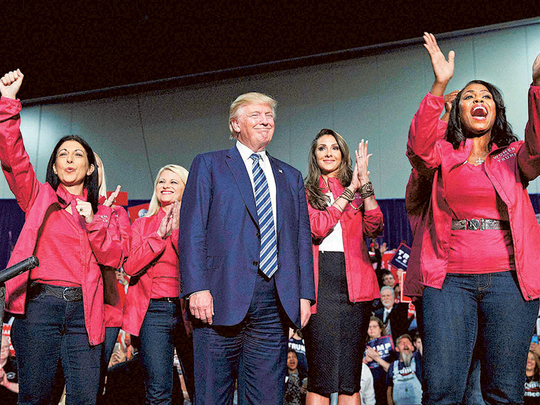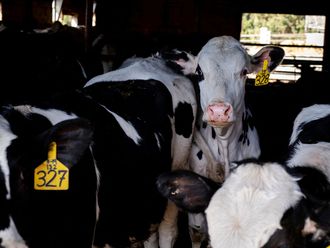
Washington: Donald Trump wielded his presidential candidacy on Friday as a weapon for savaging detractors and venting personal grievances, attacking the women who have accused him of sexual assault and unwelcome advances and railing against what he described as a vast conspiracy against him by the news media and Hillary Clinton’s campaign.
With a campaign speech in North Carolina that whirled from one target to the next, Trump accelerated his shift away from courting swing voters or delivering a message aimed at the political mainstream.
Instead, after weeks on the defensive, battered by disclosures about his treatment of women and about his business dealings, Trump appeared increasingly consumed with the idea that he has been wronged and bent on convincing his fans that sinister forces are to blame for his political decline.
Trump told the restive crowd that his advisers wanted him to focus on his core economic message, but that he had no intention of allowing his critics to go unanswered.
“My people always say: ‘Oh, don’t talk about it. Talk about jobs. Talk about the economy,’” Trump said.
“But I feel I have to talk about them, because you have to dispute when somebody says something,” he added of the allegations against him. “Fortunately, we have the microphone. We’re able to dispute; some people can’t.”
Even as two more women came forward on Friday to say he had groped them, Trump dismissed the mounting accusations as “total fiction” and “lies, lies, lies.” He assailed the motives of the women speaking out against him, and seemed to mock two of them as not attractive enough to draw his interest.
“Believe me, she would not be my first choice,” Trump said of Jessica Leeds, who said Trump groped her on an airplane in the 1980s. He referred to Leeds, now 74, as “that horrible woman.”
He was similarly dismissive of Natasha Stoynoff, a former writer for People magazine, who accused Trump of physically accosting her during an interview. “Check out her Facebook page, you’ll understand,” he said.
Trump also ridiculed his opponent in the presidential race, Clinton, for saying that he had crowded her physically during their last debate, and he seemed to offer an insult about her physique. When Clinton walked in front of him, he told a crowd in Greensboro, North Carolina, “Believe me, I wasn’t impressed.”
And as he blasted the women who have made allegations against him as fabricators, Trump suggested that perhaps someone should make similar claims against President Barack Obama next.
“Why doesn’t some woman, maybe, come up and say what they say falsely about me — they could say it about him,” Trump said.
Though Trump has said he will provide information to refute his accusers’ stories wholesale, he offered no such evidence in North Carolina. He has also loudly threatened to sue multiple publications for printing the stories of his accusers, but as of Friday evening no such suit had been filed.
Trump made only passing reference to the newest accusations against him. In an interview with The Washington Post, a woman named Kristin Anderson said Trump had slipped his hand beneath her skirt at a Manhattan nightclub in the early 1990s.
Trump’s spokeswoman denied the account, and Trump said in his speech that certain details were implausible because he rarely sits alone at nightclubs. But The Post did not say Anderson had described Trump as being alone.
A second woman, Summer Zervos, a Republican and a former contestant on “The Apprentice,” said at a news conference in Los Angeles that Trump had tried to seduce her over dinner at a hotel in 2007, grabbing her breasts and thrusting his pelvis into her body. Zervos, 41, appeared alongside Gloria Allred, the celebrity litigator and a Democrat who was a delegate for Clinton.
Trump denied in a statement several hours later that he ever had a meeting with Zervos at a hotel or “greeted her inappropriately.” He again attacked the media and said he would “take my message directly to the American people.”
The claims against Trump have gained a momentum of their own since the revelation on October 7 of a recording in which he boasted to a television host about sexually assaulting women. That tape led to the direct questioning of Trump, at Sunday’s debate, about whether he had ever actually done the things he described. Trump’s denial prompted Leeds to come forward in an interview with The New York Times; Anderson said Leeds had inspired her to tell her story.
After learning of Leeds’ story, Anderson told The Post, she decided: “Let me just back these girls up.”
Leading Republicans have already pulled back from his campaign, and new signs of distance emerged Friday between Trump and the party he nominally leads.
Sen. Patrick Toomey, R-Penn., who is seeking re-election, released a television commercial saying he has “a lot of disagreements” with Trump. And in a closely fought congressional race in central New York, the National Republican Congressional Committee has an ad vowing that its candidate, Claudia Tenney, will “stand up to Hillary Clinton” — implying that Clinton will be the next president.
Paul Ryan, R-Wis., the speaker of the House, who announced this week that he would no longer defend Trump, ignored him entirely in a speech to college Republicans in Wisconsin. Ryan criticised Clinton and Democratic policies, but made no case for his own party’s nominee.
Trump, who has savaged Ryan repeatedly this week, declined to revisit their conflict Friday afternoon.












